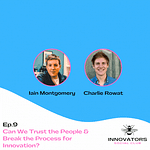SIDEBAR is a podcast born out of the Innovators Social Club, hosted by Iain Montgomery and Charlie Rowat. It’s the conversation after the main event, exploring tangents that could turn into something bigger. The sort of topics that spark up in the room but don’t always make it into the official dialogue.
Rooted in the discussions that emerge from the innovation community and events we host as well as attend, SIDEBAR is an informal, no bullshit exploration of the themes shaping strategy, innovation and business, that perhaps aren’t getting enough airtime. Drawing on our own experiences, guest insights and the occasional contrarian take, we use conversation as a way to test ideas, challenge assumptions and see where things go.
No rehearsed thought leadership. No forced frameworks. Just real discussions about what’s actually working, what’s not and where we should be paying attention next.
Can AI actually help solve loneliness, or is it just another layer of distraction papering over the real problems that have been amplified by technology?
This felt like a good starting point for a SIDEBAR conversation, especially after the latest incarnation of Mark Zuckerberg was doing his thing to pitch AI companions as fix for the America’s loneliness epidemic. On paper, to a robot, maybe it sounds promising: if people have fewer than three close friends (hmm…), then why not fill the gap with smart, ever available AI bots?
Interesting proposition give for the past twenty years Facebook has supposedly been about connecting the world through friendship. Well if that’s not been working, is there a reason to trust them with a sequel? In many ways, the Meta machine is incentivised to destroy the things they’ve acquired like Instagram.
We push back a bit on the idea that social media created loneliness because it didn’t: people have been lonely for a long time. But platforms like Facebook have certainly surfaced that loneliness and significantly amplified it. Before, you might be alone at home but unaware of what you were missing out on. Now, you’re alone, thumbing through curated feeds of everyone else’s highlight reel, unaware of how real it really is. Social media has effectively turbocharged the feeling that you’re on the outside looking in.

There’s also something about digital rejection that stings more. Offline, rejection is typically quiet, private, maybe even forgettable. You chat someone up at a bar, they’re not interested, you move on, maybe a mate teases you a little bit if your British, or gives you a shot of encouragement for next time if you’re American. Online though, rejection can be public, persistent, and sometimes algorithmically reinforced … a far more intimidating loop to break.
Removing the friction from community
Through our chat, we did start thinking about the broader cultural shifts. Working class communities, historically, were built on reciprocal trust: you borrow a tool, help each other out, watch each other’s kids. But the booming digital marketplace has hollowed much of that out, turning mutual help into paid services and transactional gigs, and cheap toolsets that can be bought on Amazon. It’s not just social media; it’s the gig economy, the delivery apps, the subscription models. We’ve moved from relationships to transactions, and the social fabric has frayed as a result.
The pandemic only made this more pronounced. We invested in our homes, pizza ovens, fancy coffee machines, plush furnishings, and made domestic life feel more luxurious than ever. But that comfort came at a cost in how we made staying in easier and going out less necessary. For many of us the cost of going out has become prohibitive. The can of beer at home, perhaps with the immediate family or friend group, over expensive pints with people you might hang out with more by chance. We’ve insulated ourselves, both literally and figuratively.
It’s perhaps important to rethink the pub, not just as a place to drink, but as vital social infrastructure. What if we taxed supermarket beer more heavily and lifted tax burdens on pints at the local? That would encourage people to meet, mingle and share space, crossing lines of class, politics, wealth and background. Sometimes, fixing social problems isn’t about inventing new tech, but rethinking the incentives around old and familiar spaces.
Of course, there are examples of tech platforms that try to push people offline. Bumble BFF, senior companionship apps, dating platforms like Thursday all attempt to move the digital into the physical. Though they are certainly more exception than the rule, for the economic incentive is almost always tilted the other way. Platforms want you glued to their interfaces, whether that’s what you really want or not. They measure success in engagement metrics, not in whether you built a meaningful connection and logged off.
Facebook ain’t all bad
We’ve both noticed an unexpected bright spot amongst this, and weirdly, it’s in the Meta stable. Despite its chaotic, Wild West feel, Facebook Marketplace actually facilitates neighbourly interactions. Parents offloading baby gear, people selling bikes or furniture to others in the community, the kinds of little interactions that sometimes spark real world friendships and build community more effectively than the carefully curated social feed.
Facebook Marketplace isn’t even proper AI, it’s search with perhaps a little bit of algorithmic dressing to surface the most relevant (closest?) things. But it brings people together who might not otherwise be together. Other bits of the internet world have done that too, often for things like niche interest groups, or even ones that might be considered a bit taboo. What many of these online communities are really good at, is helping people have an outlet to share something that might be a bit embarrassed about without fear of judgement. And that is something we know AI can help with.
We can start connecting some loose threads here. Yes, AI can make you feel less lonely, but it won’t actually make you less lonely unless it helps bridge you to real human relationships. Technology shouldn’t be a destination but a hand-off, a tool that nudges you toward the next step like a real-life event, a conversation with someone in your town, or the nudge you need to see a doctor about that weird lump.
Tech shouldn’t, and can’t, pretend to replace human reciprocity. You’re not going to be a friend that’s there for your AI are you?
Bringing back some analogue friction
There’s a few interesting examples of where the thing that’s missing is the in-person points of social friction that can go a long way to alleviate a sense of loneliness. That might be the example of the Netherlands (and maybe, Germany), where doctors sometimes prescribe train tickets to depressed patients. The idea is to get people out of their bubble, take a day trip, explore somewhere new. That kind of analog intervention can do wonders for mental health, away from the screen.
It sort of helps with the loss of approachability. It’s not just that we’ve moved online, it’s that we’ve lost the casual, socially permissible frictions that used to pull people together. Weirdly, the decline of smoking might have played a bit of a role in this where asking for a light was once an easy, low stakes conversation starter. Now, with everyone glued to their phones, AirPods in, sunken into their own digital cocoons, the default signal is unavailable. Spontaneous interactions feel awkward, or worse, intrusive.
We wonder if you have to go back to school (and early stage parenting) to start solving for some of this, not just banning smartphones outright (though that is happening), but cultivating social resilience, teaching kids how to talk to strangers, how to navigate boredom, how to make eye contact without a screen mediating the experience. Maybe it means handing kids dumb phones, not smartphones, and letting them fumble through real-world interactions the messy, human way.
Is something changing?
There are glimmers of hope where we’ve noticed a weak signal of how some late teenagers are already pushing back, becoming more aware that too much screen time isn’t good for them. There’s an emerging cultural awakening, a hunger for something more intentional, more embodied, more real.
At the same time though, as AI and more ubiquitous computing keeps getting better at delivering hyper-personalised experiences, perfectly tailored games, films, perhaps products, we risk fragmenting culture even further. If every person’s version of a game or a show is subtly different, what’s left to share, to talk about and experience collectively? Without shared cultural experiences, we may all end up living in narrower, lonelier worlds.
It all brings us back to craft and care over slop. What sticks in our minds isn’t technical polish or algorithmic optimisation, but the humanity behind . Whether it’s a beautifully made film, an intimate music gig that your mate (not AI) recommended to you or a gritty lower league sports match, the resonance comes from knowing that people cared. Craft, intention and presence still matter.
Our takeaway isn’t that technology is bad, or that AI has no role to play. But we need to make sure we don’t just accept the tools we’re given by companies whose goals don’t align with ours. The best use of AI is to amplify human connection, not replace it; to serve as a bridge, not a barrier. If we can keep that front of mind, maybe we can build tools that make us not just feel less lonely, but be less lonely.
And if you got this far, have a read of this, which sort of formed the jumping off point for the entire conversation.













Share this post